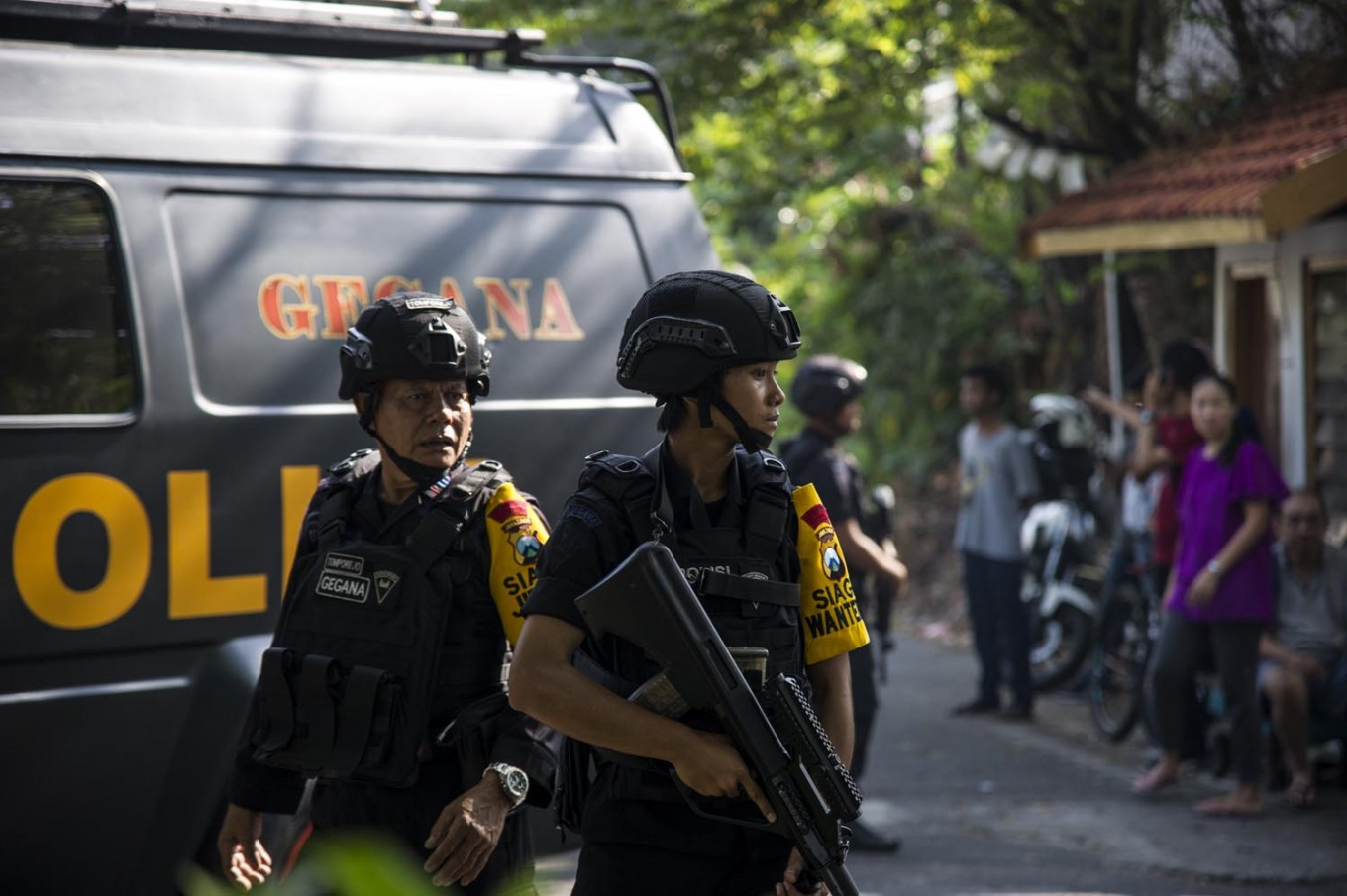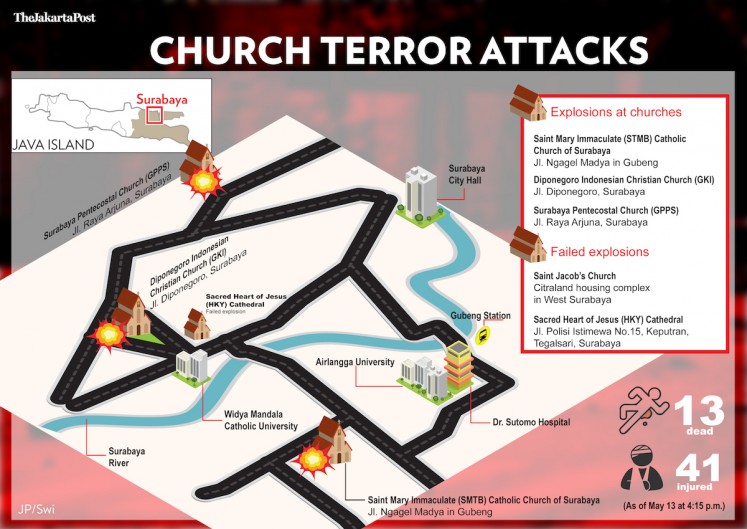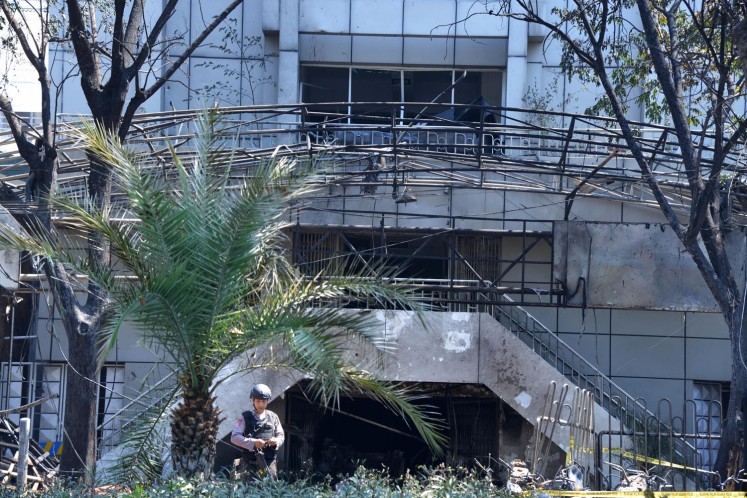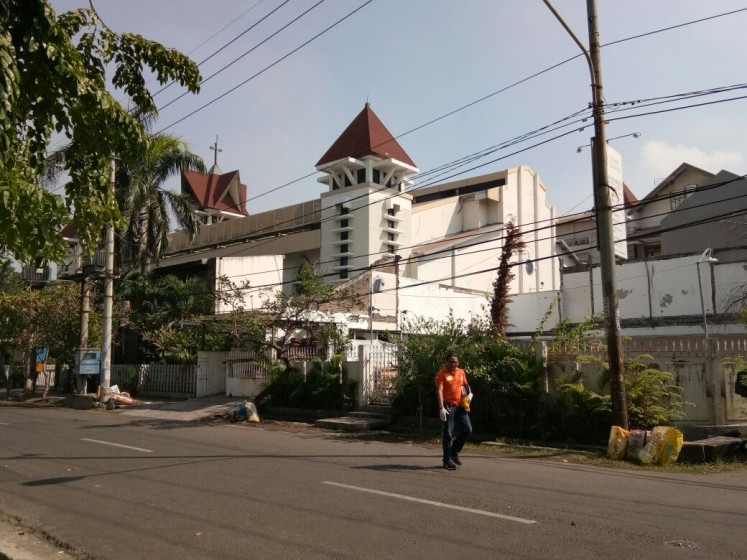Surabaya church bombings: What we know so far

Indonesian police officers patrol outside a church following an alleged suicide bomb attack in Surabaya on May 13. (AFP/Juni Kriswanto)
Photos and videos of the aftermath of the bombings, some of them graphic, spread quickly online, while the East Java Police were still gathering information of what had just transpired in the province’s capital, Surabaya, the nation’s largest city after Jakarta.
Below is what we know so far about the bombings.
The number of explosions
Three bombs exploded in at least three churches in Surabaya shortly before Sunday services began.
East Java Police spokesman Sr. Comr. Frans Barung Mangera told The Jakarta Post the explosions took place at Saint Mary Immaculate Catholic Church (STMB) on Jl. Ngagel Madya in Gubeng, Surabaya Pantecostal Church (GPPS) on Jl. Raya Arjuna and the Diponegoro Indonesian Christian Church (GKI) on Jl. Diponegoro.
The first explosion took place at Saint Mary Immaculate Catholic Church. The second and third explosions followed five minutes apart, the police said.
Two other attempted attacks were also reported at two other churches. They are Saint Jacob’s Church at Citraland housing complex in West Surabaya and Sacred Heart of Jesus Cathedral on Jl. Polisi Istimewa.
The bombs failed to explode.
 (JP/Swi)
(JP/Swi)
Latest death toll
As of 4:15 p.m., the number of fatalities had risen to 13 people, while 41 suffered from injuries, the police confirmed. One victim was identified as a member of congregation of the SMTB church in Jl. Ngagel Madya, while the other had yet to be identified.
While most of the victims were members of the churches’ congregations, the police also found the perpetrator among the deceased at SMTB church. Frans later said that the bombings were suicide attacks.
Who is responsible for the bombings?
The Islamic State group was responsible for suicide attacks against three churches in Indonesia that killed at least 11 people on Sunday, it said via its propaganda agency Amaq.
“Three martyrdom attacks killed 11 and wounded at least 41 among church guards and Christians,” it said via the Telegram messaging app as quoted by AFP.
The group has claimed responsibility for the riot incident at Mako Brimob, which led to the deaths of five members of the police’s elite counterterrorism squad, Densus 88, and a 36-hour standoff.
 A policeman stands guard outside the Surabaya Centre Pentecostal Church (Surabaya Gereja Pantekosta Pusat) in Surabaya, East Java on May 13, 2018. A series of blasts, including a suicide bombing, struck churches in Indonesia on Sunday, killing at least nine people and wounding dozens in the deadliest attack for years in the world’s biggest Muslim-majority country. (AFP/Juni Kriswanto)
A policeman stands guard outside the Surabaya Centre Pentecostal Church (Surabaya Gereja Pantekosta Pusat) in Surabaya, East Java on May 13, 2018. A series of blasts, including a suicide bombing, struck churches in Indonesia on Sunday, killing at least nine people and wounding dozens in the deadliest attack for years in the world’s biggest Muslim-majority country. (AFP/Juni Kriswanto)
Female suicide bombers
Witnesses said the alleged suicide bombers in one of the attacks were two women who were accompanied by a young girl.
The witnesses, Tardianto, said the two women and a young girl wearing niqabs hurriedly entered the area surrounding the church. According to Tardianto’s account, a security officer at the church was walking behind and trying to stop them, however the two women split up before detonating their explosives. The young child reportedly survived, but suffered injuries.
Tardianto’s account was echoed by another witness, Mulyanto, a parking attendant at the church.
The police have taken Tardianto to a police station for further questioning.
 One victim was identified as a member of congregation of the Santa Maria Tak Bercela church on Jl. Ngagel Madya, while the other had yet to be identified. (JP/Wahyoe Boediwardhana)
One victim was identified as a member of congregation of the Santa Maria Tak Bercela church on Jl. Ngagel Madya, while the other had yet to be identified. (JP/Wahyoe Boediwardhana)
What happened after the explosion?
Police officers have been deployed to the crime scenes to investigate and safeguard the areas, including members of Brimob and the bomb squad. The police earlier said they would focus first on the evacuation of victims.
National Police chief Gen. Tito Karnavian departed for Surabaya to oversee the investigation on the attack, as reported by kompas.com. The police general arrived at noon and went to the crime scenes as well as the East Java Police headquarters.
President Joko “Jokowi” Widodo had also flown to the city to assess the latest conditions of the ground zero, as well as visit the bomb attack victims in hospitals.
The bombings also prompted the Surabaya administration to cancel the Rujak Uleg Festival on Jl. Kembang Jepun, slated to be opened by Mayor Tri Rismaharini at noon, to commemorate the city’s anniversary. A committee member for the festival, Lainin, said the cancellation was necessary as the situation was considered unsafe, as quoted by tempo.co.
The attack prompted other regions to raise its alert status to siaga 1, the highest level. The regions included were Jakarta, Riau Islands and Bali. (ahw)
Editor’s note: This story was updated on Sunday at 9: 25 p.m. to include an official claim of responsibility from the Islamic State.
Topics :
-
terrorism, SurabayaBombings, church-attack, surabaya, East-Java, bnpt, Indonesia, church,surabaya-church-bombings
Source:thejakartapost.com
